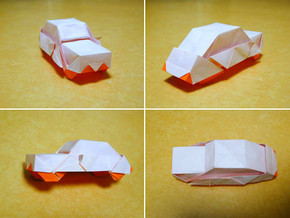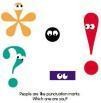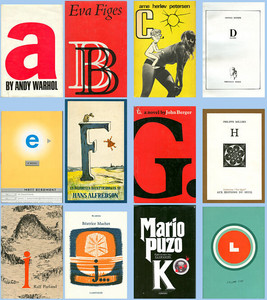
 |
|
|
 |
 |
 |
If "aphasia" is the inability to express speech, what is the inability to remember the alphabet? " Alphasia?" Or perhaps "AphaZia?" This is my favorite description of losing one's alphabet:
Johnny spun to face a bookcase of art
criticism and wondered desperately if K came before or after N.
The alphabet, a pillar, a solace and a certainty since kindergarten,
had suddenly deserted him. He stood, bewildered and staring, as
if he’d suffered a crisis of faith. Does the alphabet
exist? If the alphabet exists, why is there so much suffering in
the world? The alphabet is dead.
—Cathleen Schine, The Love Letter
|

 |
|
|
 |
 |
 |
Eliminating Bookshelf Clutter by Double-Booking Great Works of Literature
Call for Submissions: Chronogram Seeks Humor Writing
The theme: Help eliminate bookshelf clutter by double-booking great
works of literature. Please provide a title and one-line concept pitch
for a literary twofer, e.g.:
Huckleberry Finnegans Wake. A plucky lad and a runaway slave fall asleep
on a raft in the stream of consciousness.
Inherit the Wind in the Willows. A mole, a rat, and a toad are brought
to trial by weasels for daring to believe in evolution.
Moby-Dick-and-Jane. "Look, Ishmael! See Dick breach. Breach, Dick, breach!"
Deadline September 15. Chronogram, an arts and culture magazine
serving the Hudson River Valley, seeks entries for its "Joined at the
Hip" humor contest. Winners receive a T-shirt. Send 1-3 entries to
fiction@chronogram.com, or by mail to 314 Wall Street, Kingston NY
12401.
|


 |
|
|
 |
 |
 |
Split Personalities:
All animals are famous for 15 minutes,
but some are more famous than others.
—George Warhol, author of Animal Farm
and leader of pop art movement.
so much depends
upon
a course in
miracles
—William Carlos Williamson, author of
"The Red Wheelbarrow" and A Return to Love.
God gave a loaf to Mr. Scrooge,
But just a crumb to me.
—Emily Dickens, author of "Because I Could not
Stop for Death" and A Christmas Carol.
|



 |
|
|
 |
 |
 |
Some beautiful examples of "the perfect use of a semicolon" by Mackenzie Carignan:
The broken thought is finishing; the thought is done.
He could not handle the embrace; he would have cried and shaken.
The thing you search for is here; you search for spiraling punctuation.
|

 |
|
|
 |
 |
 |
I particularly love the second paragraph of this ode to the semicolon. It's from the Financial Times (excerpted by Amygdala):
The semicolon “signals that you’re not
expressing a singular thought”, explains the prolific cultural critic,
Chris Lehmann. “It signals that there’s tension, that there is some
contradictory evidence - and you [have to] sort of trust readers to be
able to deal with that, which most editors don’t and many writers
don’t.” Menand locates this fear of complexity in the idea that
language should do no more than hold up a mirror to the world. “If you
subscribe to linguistic transparency, there’s a bias in favour of
simplicity,” he says.
[...]
It may seem bizarre to read so much into a stop on the page, but the
semicolon is a pause for ambiguity, amusement, complexity, doubt, and
nuance. If writing lacks these “genteel” qualities, can we be all that
surprised if it is either as dull as a computer manual, or as demagogic
as a soapbox on Hyde Park Corner? |


 |
|
|
 |
 |
 |
There's a very funny piece entitled " The Punctuation Hunter" on the "Unremitting Failure" blog. It concerns some people being cornered by a 48-point semicolon:
Game officials who finally got that
semi-colon said they never saw anything like it. Said it was like
something out of one of those extra-large-print books for old
people. I was like, no shit: I saw
the mother. With punctuation like that out there, you'd be safer
going to Africa to hunt exclamation marks. People see a
semi-colon, they laugh. Because a semi-colon looks
harmless. Well, go ask Charlie how harmless they are. Go
ask Charlie.
In other semicolon news, James J. Kilpatrick recently wrote a funny diatribe against the "obnoxious" semicolon, calling it "sissy" punctuation:
It is not easy to write with dispassion
of the odious semicolon, but let me try: Except for its function in one
copy-editing circumstance, the semicolon is worthless. It is the
most pusillanimous, sissified, utterly useless mark of punctuation ever
invented. Sensitive editors should abolish it forthwith.
Forthwith! [...] The semicolon is a belly-up guppie in a tank of
glorious Siamese fighting fish. It's girly. It is not just
probably the most useless of all forms of punctuation. It is
absolutely, positively the most useless of all such marks ever invented.
|

 |
|
|
 |
 |
 |
Examples of Automotive Haiku from Car Talk:
flaming wrinkled death
flies down the road in first gear
with her blinker on
--Gregory Engel
Hilltop. Lake below.
My car sinks so slowly. Thank
god it's a rental.
--Carlisle Landel
|

 |
|
|
 |
 |
 |

The strange language spoken by circus owner Papa Lazarou, from the British dark comedy series The League of Gentlemen, may technically be gibberish ("Autom, sprow. Cana, tik bana! Sandwol, but no sera smee?") But it was inspired by Parlari, the private language of traveling British circus folk.
Pioneering West African composer Julien Jacob sings in his own mysterious, imaginary language, allowing his listeners to interpret his songs in their own way.
More from AskMefi: I'm 6'8". People are always asking me how tall I am. Instead of telling the truth, what are some witty, non-confrontational responses I might use? "Depends on where you start measuring." Vesona
is a universal language proposed by Dr. Alesha Sivartha, in which the
first two or three letters of any word give the general meaning and the
added letters specialize these meanings. An elaborate circular diagram (copy and paste link in new window) shows how Vesona encapsulates all of human knowledge. Verdurian
is a language spoken by 55 million imaginary people. The fruitful
creativity of Mark Rosenfelder offers background on the history,
grammar, and literature of Verdurian, as well as a Language Kit for constructing your own artificial languages. How to say How many flowers are in Pia Zadora's vase? in Esperanto? From Prolific Lo-Fi recording artist Ken Clinger,
who records songs in both English & Esperanto. He juxtaposes
awkward practice sentences from foreign language tutorials, creating
absurd, surreal alternate realities.
Why English is a Silly Language.
"It's really a wonder that any one manages to successfully speak
English at all. That people learn it all over the world is just
incredible... I mean amazing."
Tlön, Uqbar, Orbis Tertius. Jorge Luis Borges dreamed of a language called Ursprache
with absolutely no nouns. For example, there's no word for "moon," but
there's a verb meaning "to moon" or "to moonate." The sentence "The
moon rose above the water" in Ursprache would translate as "Upward
behind the onstreaming it mooned." The hypothetical lost continent of Mu (also known as Lemuria)
is said to have been destroyed in a global upheaval tens of thousands
of years ago. Unorthodox researcher Col. James Churchward believed he
rediscovered Mu's alphabet, comprised of beautiful and intricate glyphs. This is a post that I am “co-blogging” with Hanan Levin of Grow-a-Brain. Thank you, Hanan, for the links you suggested!
|

 |
|
|
 |
 |
 |
Ben Macintyre of The Times
is against the bid to flush semicolons out of our prose — what he calls
"semi-colonic irrigation." He makes the following lovely point:
The beauty of the semi-colon lies in
its very vagueness. It indicates both connection and division. It is a
gentle way of connecting thoughts, without applying the abrupt brake of
a full stop or the breathiness of a comma. It implies a qualification
or refinement of the idea stated in the first part of the sentence.
Sometimes a string of semi-colons shows an evolving idea or
description, a string of interconnected ideas.
Virginia Woolf opens Mrs Dalloway with a lovely spray of semi-colons:
“How fresh, how calm, stiller than this of course, the air was in the
early morning; like the flap of a wave; the kiss of a wave; chill and
sharp and yet (for a girl of 18 as she was then) solemn, feeling as she
did, standing there at the open window, that something awful was about
to happen; looking at the tress with smoke winding off them and the
rooks rising, falling; standing and looking . . . ” |

 |
|
|
 |
 |
 |
From The Which Punctuation Mark Are You Test:
"Congratulations! You are the semicolon! You are the highest expression
of punctuation; no one has more of a right to be proud. In the hands of
a master, you will purr, sneering at commas, dismissing periods as
beneath your contempt. You separate and connect at the same time, and
no one does it better. The novice will find you difficult to come to
terms with, but you need no one. You are secure in your elegance,
knowing that you, and only you, have the power to mark the skill or
incompetence of the craftsman. You have no natural enemies; all fear
you. And never, NEVER let anyone tell you that you cannot appear in
dialogue!" |

 |
|
|
 |
 |
 |
Speaking of semicolons, I stumbled upon the most marvelous poem by Matt
"World's Best Writer Ever" Getty, entitled "Inside the Semicolon
(Draft)." Here's the first stanza:
The sinister semicolon lurks
on the inside. Always inviting,
he calls you to follow as he opens
doors that look like walls.
To read more (you'll be glad you did), see the poetry section of Matt's website. |

 |
|
|
 |
 |
 |
After six years of determined searching, Lars Rasmussen, a purveyor of fine used books, collected a complete alphabet of books with one letter for titles (including Scandinavian letters). He was inspired by this quotation from James Joyce's Ulysses:
Have you read his F?
O yes, but I prefer Q.
Yes, but W is wonderful.
O yes, W. |

 |
|
|
 |
 |
 |
What makes a great story? Marketing expert Seth Godin
suggests that "The best stories don't teach people anything new.
Instead, the best stories agree with what the audience already believes
and makes the members of the audience feel smart and secure when
reminded how right they were in the first place." (Thanks, Gordon!) |

 |
|
|
 |
 |
 |
In English:
Two people were sitting by a fence. The first says:
"Tell me, if I'm looking at you, and thinking of something, and you
know that I'm thinking of that thing, and you're thinking of the same
thing, isn't it just as if we had said it?"
"Well, yes..."
"Then, which of us is it like he had said it?"
Translated into Zoinx:
ona be brazer ves unta`i, dalto`i. sila ro'st i tan:
= silali ga fen go, en nebasi go he`i ga, san fermisi go man xiruli,
san esasi ga mse`i fermisi go man set, san fermisi ga man tira, i`aneka
set vor mse`i silata gi`o'st? =
= sen dot... =
= san, eni`oka set ane`i fen gi`o, mse`i i`a'st vor mse`i silata ge`i set? =
The Zoinx
language (invented in 1993), does not have a fictional population of
speakers or a corresponding history, yet "quite a bit of cultural
information can be gathered from the language itself."
|


Page 73 of 74

> Older Entries...

Original Content Copyright © 2026 by Craig Conley. All rights reserved.
|





 = Tiger Woods is awesome, and other helpful phrases from the
= Tiger Woods is awesome, and other helpful phrases from the 

